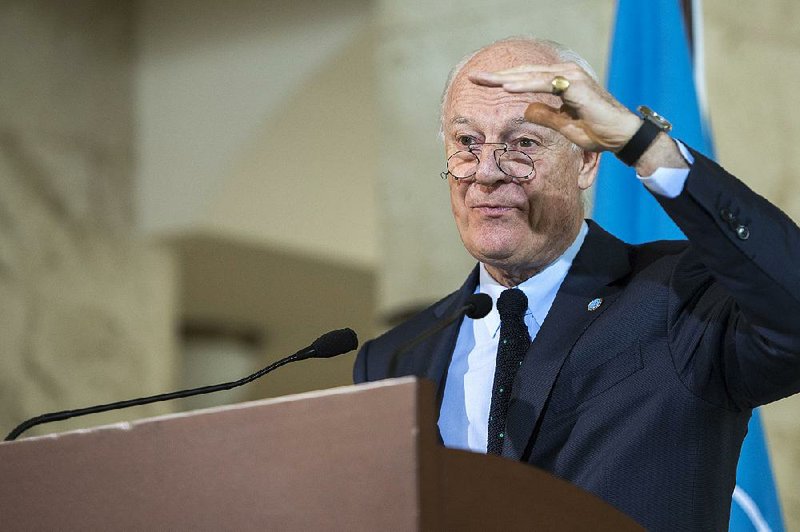GENEVA -- Russia defended an offensive near Syria's Aleppo as a response to "provocations" by an al-Qaida wing, and the opposition blamed President Bashar Assad's forces for the near collapse of an almost two-month truce and warned they are seeking to seize control of the city.
Armed opposition groups that have signed on to the cease-fire must end their ties with the al-Qaida-linked Nusra Front to avoid getting attacked, said Alexei Borodavkin, Russia's ambassador to the United Nations in Geneva and representative at Syria peace talks.
"If they broke off decisively from Nusra and indicated where their positions are, we could ensure the cease-fire would apply strictly to them," Borodavkin said in an interview Wednesday, referring to the Army of Islam and Ahrar as-Sham, two main rebel factions.
A recent upsurge of fighting around Aleppo and in the north, the northwest and the center of Syria is threatening to torpedo the truce and peace talks in Geneva. The main opposition group on Monday quit the negotiations and said it won't return unless the government halts its attacks and allows access for aid. The U.S. urged Russia, which has waged an air campaign in Syria for six months, to press Assad to stop targeting the rebels.
President Barack Obama said Thursday that his Russian counterpart, Vladimir Putin, must intervene to stop the truce from disintegrating completely. The two powers are the main co-sponsors of the peace process and brokered the cease-fire, which excludes the Islamic State extremist group and the Nusra Front.
Staffan de Mistura, the U.N. special envoy for Syria, said he would address the "next steps" in the U.N.-brokered peace talks today after the Western-backed opposition walked out, accusing Assad's government of trying to wreck the negotiations with new fighting.
De Mistura called for improved aid access to besieged areas, which he said would boost chances for salvaging the teetering cease-fire.
"Bottom line: If humanitarian aid increases as they should be and the cessation of hostilities goes back into what we would consider a hopeful mood, that would certainly help the political discussions," he told reporters.
The opposition group later said it would keep "technical experts" in Geneva through next week to discuss issues such as humanitarian aid even though it has pulled back from the peace talks.
The five-year civil war has killed more than 250,000 people, forced millions from their homes, sparked Europe's biggest migrant crisis since World War II and enabled the Islamic State to gain control of territory.
Russian Foreign Ministry spokesman Maria Zakharova warned that the suspended participation of the Syrian opposition in the Geneva talks could lead to "a return of total armed conflict"
"We have a situation where terrorists are desperately trying to disrupt the political process," referring to the walkout by the Syrian opposition's High Negotiations Committee.
Zakharova told reporters in Moscow that the armed standoff in Syria is growing, especially to the north and south of Aleppo.
Some 600,000 people are trapped in Aleppo, once the most populous city in Syria and its commercial capital, said Asaad al-Zoabi, a former Syrian general who leads the main opposition delegation at the peace talks. Al-Zoabi denied any links between the rebel factions and Nusra.
"They're trying to destroy what's left of Aleppo and take full control of the city," al-Zoabi said Thursday in an interview in Geneva. "The aim is to sabotage the talks and a political settlement and rely on a military solution. They're trying to send a message that they have the upper hand on the ground."
Bashar Ja'afari, Syria's ambassador to the U.N. and its lead negotiator in Geneva, said Wednesday that the government has the "legitimate right to continue fighting terrorist groups."
A top Russian commander, Lt. Gen. Sergei Rudskoi, said last week that Syrian government forces backed by Russian air cover were responding to an assault by Nusra involving 10,000 fighters aimed at cutting off the main road between the capital and Aleppo. "No storming of Aleppo is planned," he said.
Borodavkin said the continuing attacks carried out by government forces "are in response to Nusra starting the offensive. We anticipated that opponents of the political settlement would carry out provocations to sabotage the cease-fire and the political process in Geneva."
The spark for the escalating violence came earlier this month when the rebels hit back against foreign allies of Assad, attacking south of Aleppo and catching Iranian forces there by surprise, according to Scott Lucas, professor of international politics at Birmingham University in the U.K.
"With no political or military concessions from Assad, it was a matter of time before the rebels walked out [of talks]," Lucas said. "For now, it's going back to the battlefields."
Assad's future remains the toughest issue in the peace talks, which are meant to lead to an interim power-sharing administration and culminate in elections in 2017 under a new constitution.
Syria has said opposition calls for Assad, 50, to leave the office he' has held since 2000 are a "red line." The regime is offering opposition figures it considers acceptable a limited role in a national unity government. Opposition leaders say that neither Assad nor close associates who have been involved in killing Syrian citizens can remain in power during a transitional phase.
Information for this article was contributed by Henry Meyer and Kambiz Foroohar of Bloomberg News and by Sarah El Deeb, Zeina Karam and Suzan Fraser of The Associated Press.
A Section on 04/22/2016


